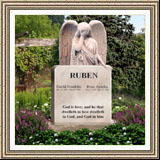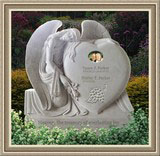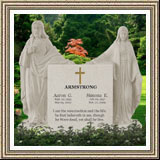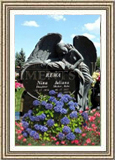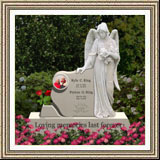|
Planning a Funeral After an Unexpected
Death - Part One
By Christopher M Davis
There is no easy way to plan the funeral of a loved one
after an accident. You are likely feeling emotionally
drained, physically exhausted, and over-stressed as you
approach the memorial plans. When the death of a loved
one is anticipated because of illness or old age,
funeral plans have often been made or discussed
beforehand and the family members may have had time to
prepare themselves for the loss. If preparations like
these have already taken place or if you have some idea
of how your loved one wanted his/her funeral to be
conducted, it is obviously much easier to put the
funeral together quickly.
Steps to Take Immediately After the Death
There are certain steps to take immediately after the
death of your loved one. They include:
1. Pronouncing the Death. As soon as someone passes
away, the death needs to be pronounced by a
professional. This normally means that you must call 911
or a coroner's office so that a medical professional can
confirm the death and make it official. If the death
results from a car accident or another serious accident,
the deceased has either been pronounced at the scene or
later at the hospital. For many unexpected deaths caused
by accidents you don't need to call 911 or the coroner's
office because medical professionals will be on staff
and able to pronounce the death immediately.
2. Embalming. Within the first few hours of death you
need to decide if you want your loved one's body to be
embalmed. Embalming is a process designed to preserve
the body. If you embalm, you give yourself the option of
having an open casket funeral and prolonging the funeral
process, since the body will not have to be buried or
cremated right away. It may make sense to choose
embalming if the family wants more time to plan for a
funeral or if an open casket is preferred.
3. Selecting a Funeral Home. You will need to call a
crematorium or a funeral home to come and pick up your
loved one's body from the hospital or place of death.
The funeral home will usually make the necessary
arrangements for transportation. If the death was
unexpected, then you may not have identified a funeral
home that you prefer to use, so you will need to select
one Most churches, synagogues or other places of worship
have a member or parishioner responsible for assisting
with funeral planning, so this is an excellent place to
start. Many funeral homes also have web pages now and
most are listed in the yellow pages. By taking a look at
the various funeral home websites, you can get a feel
for the home. If possible, consider selecting a funeral
home close to your loved one's community so that it is
easier for mourners who wish to attend the service.
4. Notifying Friends and Family. As soon as possible,
you or other family members should start contacting
people to make them aware of the loss. If you are an
immediate family member like the spouse, parent, sibling
or child of the deceased, you may want to contact a
close friend or other family member to make most of the
calls. Consider making the calls after you have made
plans for the funeral so that you can let people know
the location, date and time of the services.
As you begin making arrangements for the funeral or
memorial service, you will want to think about what your
loved one would have wanted. Where there has been an
unexpected death resulting from an accident, the victim
may not have made his or her wishes known. It may also
mean that you have never talked about a memorial
service. If this is the case, it will be up to you to
make the arrangements according to what you think your
loved one would want.
To plan a meaningful service, think of things that most
characterized your loved one: his/her favorite
activities; favorite flowers; meaningful songs, hymns,
or poems, etc. Once you have made note of your thoughts
about your loved one's personality and activities in
life, it will become easier for you to choose some
details over others for the funeral.
Seattle wrongful death attorney Chris Davis is the
author of 'Wrongful Death in Washington State' a guide
book for families that are trying to navigate the
confusing legal process following the accidental death
in Washington State of a loved one. He is the founder
and principal lawyer at Davis Law Group, a Seattle
personal injury law firm know for its innovative
approach. You can learn more by visiting: http://www.DavisLawGroupSeattle.com. |

